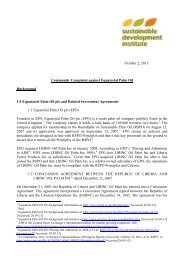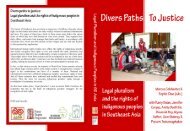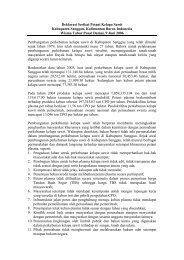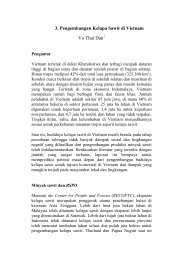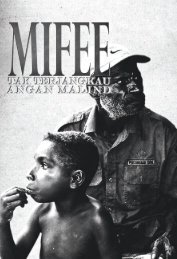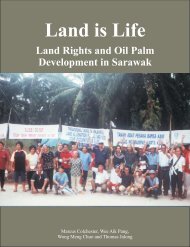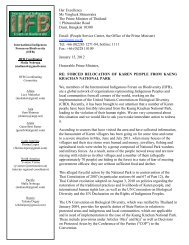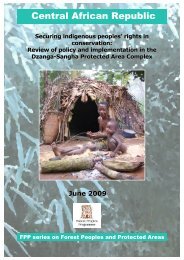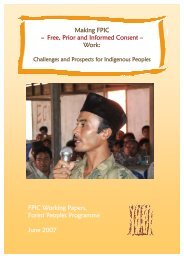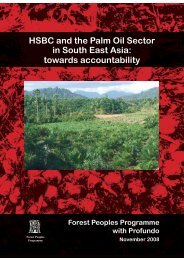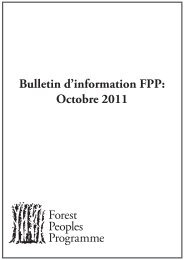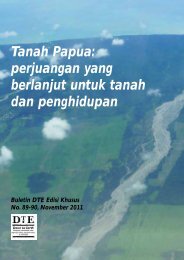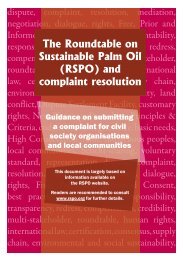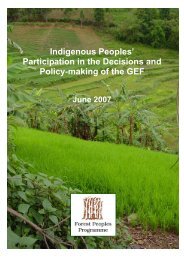The Upper Caura, Venezuela - Forest Peoples Programme
The Upper Caura, Venezuela - Forest Peoples Programme
The Upper Caura, Venezuela - Forest Peoples Programme
Create successful ePaper yourself
Turn your PDF publications into a flip-book with our unique Google optimized e-Paper software.
Protecting and encouraging customary use of biological resources: <strong>The</strong> <strong>Upper</strong> <strong>Caura</strong>, <strong>Venezuela</strong>_________________________________________________________________________________________At least since the late 1960s, the Ye’kwana have had a conscious policy of defending theirterritory against outside intrusion. <strong>The</strong>y have achieved this by a number of means. First,they have established communities at riverine access points to discourage entry by colonistsand miners into their territory. In this way they have asserted their proprietary rights totheir territory and sought to regulate access by non-indigenous persons. In the early 1970s,the Ye’kwana of the <strong>Upper</strong> Ventuari mobilised to expel miners trying to enter their lands byair 38 and in the 1990s, in the <strong>Upper</strong> <strong>Caura</strong>, the Ye’kwana decided to close their own placermines so wildcat miners would not be tempted to invade their territory.Commencing in 1983, with funding from international non-governmental organizations,the Ye’kwana have also begun to install two-way radios in all their main villages to facilitatethe establishment of a basin-wide communications network. Since the late 1990s, more ofthese radios have begun to be made available to the larger and more established Sanemavillages also. Most of these radios are now equipped with high antennas, solar panels,batteries and chargers. <strong>The</strong>y allow the communities to exchange information amongstthemselves, organize their interactions with government bureaux and private sectoragencies and call for emergency medical assistance from Ciudad Bolivar. <strong>The</strong>y are also usedto coordinate inter-community meetings, trading voyages and, increasingly, to plan themanagement of their territory.Basinwide, Multi-ethnic AssociationIn the mid-1990s, in response to Government plans to construct a major dam that woulddivert the waters of the <strong>Upper</strong> <strong>Caura</strong> into the Paragua, the Ye’kwana decided they needed toestablish a multi-ethnic basin wide association to defend their territory against incursions.<strong>The</strong> resulting organization, ‘Kuyujani’, was named after the culture hero of myth who hadfirst defined the boundaries of the territory (see above). <strong>The</strong> express aims of Kuyujani are tosecure the indigenous peoples’ rights to their territory, prevent destructive developments inthe region and promote effective management of the territory.<strong>The</strong> organisation is subject to the authority of an annual General Assembly which bringstogether members of all the communities of the region. <strong>The</strong> Assembly elects the membersof Kuyujani for a two-year term during which period they seek to act in the collectiveinterest of the communities and represent them in negotiations with outside interests.During its two year term, Kuyujani is comprised of a Council made up of 10 regionalrepresentatives from the various parts of the river basin, 14 spokespersons on key issuessuch as health, education, human rights, environment, development, sport and culture and4 elected chiefs, two of whom are Ye’kwana and two Sanema. Day to day functions arecarried out by a small bureau which includes a Coordinator, his Deputy, a SecretaryGeneral, an Executive Secretary and an Administrator. An accountant is also contracted tohandle the organisations finances.38 Walter Coppens, 1972, <strong>The</strong> Anatomy of a Land Invasion Scheme in Yekuana Territory –<strong>Venezuela</strong>. International Work Group for Indigenous Affairs, Document 9, Copenhagen.37



